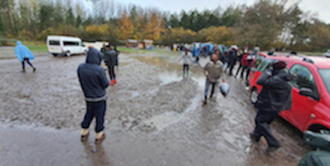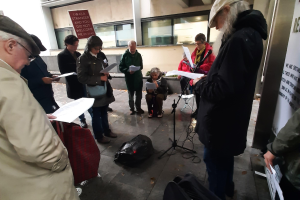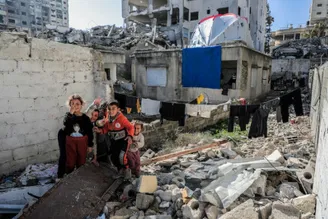Eyewitness: Refugees in Calais face bleak winter

Food distribution in Dunkirk. Image Neli Ban.
Poorly pitched tents shake in the wind as the rain beats down on the only place that refugees in northern France can call home. Following extensive evictions of the small areas where it is possible to assemble a makeshift camp, families and individuals in Calais and Dunkirk who are from Sudan, Afghanistan, Kurdistan, Syria and Eritrea suffer as winter takes hold.
There are still more than 400 people living rough in this part of France. Following the destruction of 'the Jungle' in 2017, conditions for vulnerable people hoping for a safe life are worse than ever.
Autumn has seen a further deterioration of circumstances that affect living conditions. As reported by aid organisation Calais Food Collective ( see: https://calaisfood.wixsite.com/calaisfood ) in September this year, the local politicians in the seaside city made it illegal to provide food in certain areas. Alongside these new regulations, the French riot police, the CRS, have been monitoring, questioning and disrupting their volunteers during food distributions in the new, permitted locations.
Neli Ban, a volunteer with another organisation, appreciates the growing problems that winter is causing. "A flimsy tent they sleep in must feel like it's about to fly off, and they have nowhere to dry their soaked clothes and shoes." Evictions of the basic camps took place last week. Tents and sleeping bags were taken or ruined, pots and pans were confiscated. Removing the ability to be able to cook is a multifaceted problem. Not only has your daily social activity been taken away, but you must now walk several kilometres in order to stand in a queue to receive a meal, and you have to do this three times a day.
As conditions in France worsen, so do the chances of being able to reach the UK. On 28th October, reports of a family from Kurdistan drowning in the sea shook the migrant community on both sides of the Channel. People from aid organisations together with refugees paid tribute to the adults and children whose lives were lost in the search for safety.
Another cause for concern are the decisions being made in the UK parliament. Family reunification is at risk after the Brexit transition period ends, as the Dubs Amendment has been repeatedly voted down, even after this tragic news. "If there are safe routes," said Lord Alf Dubs, former child refugee, "then people will take them. If there are not, people will risk their lives."
The penalty of a failed attempt weighs heavily on those in Calais. Fear of the water has to be weighed against the hope of joining family and having a new life. It takes many months and many risks for people to get even as far as France, the route from Greece through the Balkans will have included scaling mountains and facing the notorious Croatian border authority whose brutal and illegal actions are well documented ( see: https://.www.borderviolence.eu ). Another winter on the road, the elements and the police to contend with, is no way for Europe to treat vulnerable people from war-torn countries.
Hannah Parry is an organist and volunteer aid worker who has spent the last six months with aid organisations in France, Serbia and Bosnia. Find out more at: www.hannahparry.co.uk


















